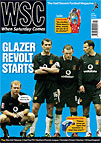 You've got to be in it to win it, as Rob Murfin reports
You've got to be in it to win it, as Rob Murfin reports
On Tuesday February 1, football fans in 195 countries logged on to the internet as FIFA initiated the ticket sales procedure for next summer’s World Cup. Ten months before the finals draw, with only the hosts Germany guaranteed to be in the competition, applicants were invited to choose from a list of numbered matches, with the date, kick-off time and venue predetermined, but with no idea which of the world’s teams they would end up watching.
With prices rising to nearly £70 even for matches in the group stage, it was an expensive way for fans to enter a lottery in the hope of seeing their own country play, but at the time of writing, somewhere in the region of 800,000 tickets have already been allocated. There is little doubt that when the draw is made in December and the match schedule is confirmed there will be an explosion of supporters swapping and reselling unwanted tickets, and it is hard to imagine how many will change hands illegally over the next 12 months.
“You can’t totally eliminate the black market,” comments Horst R Schmidt, senior vice-president of FIFA’s organising committee, “but our aim is to prevent it as far as possible.” Strange then, perhaps, that FIFA have adopted this approach. There are six months between the draw and the start of the finals in which to allocate tickets more fairly and, while setting aside a neutral area within each ground, to at least pass the majority of tickets directly into the hands of the right supporters.
Consider the minor nations that are likely to qualify, however, and it is easier to understand FIFA’s approach: whatever happens between now and the end of qualification, there are certain to be group games where few fans travel from the competing nations and where there is little interest from neutrals. Selling the tickets for these games at this stage ensures they remain an attractive purchase: currently each match still has an equal chance of involving the tournament’s big guns. The system has been engineered to reap the best financial rewards and confirms that FIFA’s principal concern is to maximise the revenue from sales, rather than to oversee a just allocation system.
Sadly, though, it seems that the most genuine supporters will be the ones to suffer. With so many tickets already dispersed at random across the globe, when the match schedule is finally decided the official ticket allocation through national associations for the fans of each competing team will be limited to just eight per cent of the relevant ground capacity – as a result those teams that find themselves in the smallest stadium, in Nuremberg, will have fewer than 3,000 tickets for their supporters.
Englandfans, the official England supporters’ club, has a membership in excess of 20,000 – only around a quarter of these stand any realistic chance of obtaining official tickets through the FA and many fans who have followed England away from home throughout the qualification process will be denied tickets to the finals through official routes, even though logic dictates that there should be far more space in the ground allocated to them.
A compromise from FIFA has been the offer of so-called “team-specific tickets”, offering the chance for fans to follow a particular country through the group stage, and apply for up to seven tickets in total, depending on how confident they are on the team’s chance of progression. It seems a reasonable solution, but in order to make these tickets as profitable as possible, they were offered on general sale with any fans entitled to apply for tickets for any country: as a result, for larger nations where demand exceeds supply many tickets have not gone to the most genuine supporters, but to those in other countries who have simply been lucky in the ballot.
Indeed within hours of the successful applicants being notified, tickets had already started to appear on eBay, offered for resale at more than ten times their market value. This was, according to a recent FIFA press release, “an unwelcome development the organising committee had feared all along”, although it seems they were not sufficiently worried to do anything to prevent it happening. Whatever efforts are made now to try to limit resales, one way or the other the tickets will find their way into the hands of those fans that were denied them in the first place.
Whether or not FIFA will learn lessons for the future remains to be seen – at the moment they’re probably still too busy celebrating annual profits of £70 million to give it much serious thought.
From WSC 221 July 2005. What was happening this month